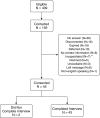Resilience in Survivors of Critical Illness in the Context of the Survivors' Experience and Recovery
- PMID: 27159794
- PMCID: PMC5021076
- DOI: 10.1513/AnnalsATS.201511-782OC
Resilience in Survivors of Critical Illness in the Context of the Survivors' Experience and Recovery
Abstract
Rationale: Post-intensive care syndrome (PICS), defined as new or worsening impairment in cognition, mental health, or physical function after critical illness, is an important development in survivors. Although studies to date have focused on the frequency of these impairments, fundamental questions remain unanswered regarding the survivor experience and the impact of the critical illness event on survivor resilience and recovery.
Objectives: To examine the association between resilience and neuropsychological and physical function and to contextualize these findings within the survivors' recovery experience.
Methods: We conducted a mixed-methods pilot investigation of resilience among 43 survivors from two medical intensive care units (ICUs) within an academic health-care system. We interviewed survivors to identify barriers to and facilitators of recovery in the ICU, on the medical ward, and at home, using qualitative methods. We used a telephone battery of standardized tests to examine resilience, neuropsychological and physical function, and quality of life. We examined PICS in two ways. First, we identified how frequently survivors were impaired in one or more domains 6-12 months postdischarge. Second, we identified how frequently survivors reported that neuropsychological or physical function was worse.
Measurements and main results: Resilience was low in 28% of survivors, normal in 63% of survivors, and high in 9% of survivors. Resilience was inversely correlated with self-reported executive dysfunction, symptoms of anxiety, depression, and post-traumatic stress disorder, difficulty with self-care, and pain (P < 0.05). PICS was present in 36 survivors (83.7%; 95% confidence interval, 69.3-93.2%), whereas 23 survivors (53.5%; 95% confidence interval, 37.6-68.8%) reported worsening of neuropsychological or physical function after critical illness. We identified challenges along the recovery path of ICU survivors, finding that physical limitations and functional dependence were the most frequent challenges experienced in the ICU, medical ward, and on return to home. Spiritual and family support facilitated recovery.
Conclusions: Resilience was inversely correlated with neuropsychological impairment, pain, and difficulty with self-care. PICS was present in most survivors of critical illness, and 54% reported neuropsychological or physical function to be worse, yet resilience was normal or high in most survivors. Survivors experienced many challenges during recovery, while spiritual and family support facilitated recovery.
Keywords: cognitive impairment; critical care; quality of life; resilience; survivorship.
Figures
Comment in
-
Broken Wings and Resilience after Critical Illness.Ann Am Thorac Soc. 2016 Aug;13(8):1219-20. doi: 10.1513/AnnalsATS.201605-327ED. Ann Am Thorac Soc. 2016. PMID: 27509152 No abstract available.
References
-
- Wunsch H, Angus DC, Harrison DA, Collange O, Fowler R, Hoste EAJ, de Keizer NF, Kersten A, Linde-Zwirble WT, Sandiumenge A, et al. Variation in critical care services across North America and Western Europe. Crit Care Med. 2008;36:2787–2793, e1–e9. - PubMed
-
- Hopkins RO, Weaver LK, Pope D, Orme JF, Bigler ED, Larson-LOHR V. Neuropsychological sequelae and impaired health status in survivors of severe acute respiratory distress syndrome. Am J Respir Crit Care Med. 1999;160:50–56. - PubMed
-
- Hopkins RO, Weaver LK, Collingridge D, Parkinson RB, Chan KJ, Orme JF., Jr Two-year cognitive, emotional, and quality-of-life outcomes in acute respiratory distress syndrome. Am J Respir Crit Care Med. 2005;171:340–347. - PubMed
-
- Mikkelsen ME, Christie JD, Lanken PN, Biester RC, Thompson BT, Bellamy SL, Localio AR, Demissie E, Hopkins RO, Angus DC. The Adult Respiratory Distress Syndrome Cognitive Outcomes Study: long-term neuropsychological function in survivors of acute lung injury. Am J Respir Crit Care Med. 2012;185:1307–1315. - PMC - PubMed
Publication types
MeSH terms
Grants and funding
LinkOut - more resources
Full Text Sources
Other Literature Sources
Medical


